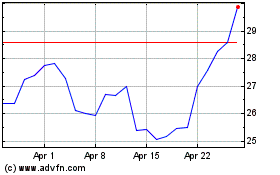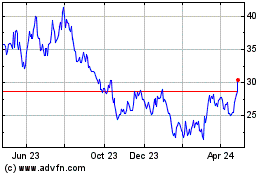Today's Logistics Report: China Bites Apple; Cargo Lost at Sea; Leasing into Freighters
January 04 2019 - 11:30AM
Dow Jones News
By Erica E. Phillips
Sign up: With one click, get this newsletter delivered to your
inbox.
China's economic stumbles are reverberating more strongly across
global supply chains. Consumers in the world's second-largest
economy are spending less on discretionary goods and big-ticket
items, the WSJ reports, as costs for basic necessities are soaring.
That's hitting global behemoths like Apple Inc., which roiled
markets this week with word that declining smartphone sales in
China contributed to a sharp falloff in revenue. China's e-commerce
titans Alibaba Group Holding Ltd. and JD.com Inc. are hitting speed
bumps as consumer spending drops. Apple's components suppliers have
already been reporting weaker results as demand has tapered off,
and the company's warning suggests orders may pull back even
further. And that signals other companies focused on selling and
moving goods in China may also start feeling financial pain.
Sometimes those container imports just can't wait to get ashore.
A Mediterranean Shipping Co. vessel lost 270 boxes in rough waters
in the North Sea, the WSJ Logistics Report's Costas Paris writes,
highlighting a rare but nagging side effect of the world's big
ocean trade flows. Geneva-based MSC hired a salvage company to
handle the spill, retrieving cargo from the sea and on Dutch island
beaches where many of the containers made landfall. Container
spills are quite rare in the ocean shipping business, with less
than 1,600 containers lost at sea annually on average, of more than
130 million shipped -- about one thousandth of 1%, according to the
World Shipping Council. Still, the industry is working on safety
measures to reduce losses further, such as verifying container
weights and establishing standard practices for loading containers
onto ships.
TRANSPORTATION
Private-equity investors are gliding into the airfreight
business. KKR & Co. is buying six widebody freighters for $1
billion, the WSJ's Doug Cameron reports, to launch a joint-venture
aircraft leasing business with Seattle-based Altavair LP. KKR is
entering the cargo segment as e-commerce companies including
Amazon.com Inc. are building out their airfreight operations -- a
move that has drawn the attention of other investors, too. KKR said
it's taking a 50% stake in Altavair and may acquire additional
assets beyond the initial six freighters, and may even even splurge
on new planes. The firm is jumping into the business amid signs
that a boom in airfreight demand appears to be tapering off.
Research group WorldACD says November global air cargo volume fell
1.4% from a year ago, and broke from usual patterns by declining 2%
from October to November.
The U.S. auto industry is showing signs of stalling. General
Motors Co.'s U.S. sales fell nearly 3% in the fourth quarter, the
WSJ's Adrienne Roberts writes, as weak business in sedans offset
GM's gains in the SUV market. U.S. automakers sold a total of about
17.2 million vehicles in 2018, defying earlier predictions of a
downturn, but the outlook for 2019 isn't optimistic as interest
rates rise and more consumers are looking to used cars. Escalating
trade tensions with China, which imported $13 billion in vehicles
from the U.S. in 2017, could also drive down U.S. vehicle
production. GM said closing several North American factories and
laying off thousands of workers, and automotive supply chains
already look to be thinning: The Association of American Railroads
says U.S. and Canadian automotive rail shipments fell 4.5% in
November.
The U.S. factory sector is signaling far fewer goods are heading
into distribution channels. The Institute for Supply Management's
manufacturing index declined last month at its steepest rate since
2008, the WSJ's Sharon Nunn and Nick Timiraos write, indicating
manufacturing expansion is coming at a slower rate heading into
2019. Growth of new orders and production also slowed sharply,
while inventories and imports declined, signaling that U.S.
companies are through with their pre-tariff stockpiling. U.S.
imports from China hit record levels last year as many companies
pulled forward orders to get ahead of impending levies on those
goods. "Inventories, rather than foreign trade (imports and
exports), were the trigger for these less-buoyant readings," IHS
Markit economist Michael Montgomery said.
QUOTABLE
IN OTHER NEWS
The U.S. private sector added 271,000 jobs last month. (WSJ)
The number of Americans filing new applications for unemployment
benefits rose by 10,000 last week. (WSJ)
A measure of factory activity in China's manufacturing sector
hit its lowest level in three years. (WSJ)
Copper prices are sliding on worries over economic growth in
China. (WSJ)
General Motors Co. and DoorDash Inc. are partnering on a food
delivery service using autonomous vehicles. (WSJ)
Retailer FullBeauty Brands Inc. is filing for bankruptcy.
(WSJ)
Edward Lampert's ESL Investments Inc. has offered $1.8 billion
for Sears Holdings Corp.'s real estate. (WSJ)
Bristol-Myers Squibb Co. is acquiring cancer-drug maker Celgene
Corp. for about $74 billion. (WSJ)
The American Trucking Associations says the driver turnover rate
tumbled 11 percentage points in the third quarter. (Logistics
Management)
The Teamsters appealed a federal ruling that U.S. law preempts
California's meal-and-break rules for truckers. (Commercial Carrier
Journal)
California officials warned warehouse operators against
contracting with trucking firms that have violated state wage laws.
(The Press-Enterprise)
Patrick Fuchs and Martin Oberman were confirmed to the U.S.
Surface Transportation Board. (Progressive Railroading)
A shortage of railcars led to a decline in shipments last month
at state-owned Coal India. (Nikkei Asian Review).
Norfolk Southern Corp. is adding automated equipment at its
terminals in Chicago and Memphis. (Container News)
A.P. Moeller-Maersk A/S container maker Maersk Container
Industry will shut down a China factory as it focuses on
refrigerated equipment. (Shipping Watch)
The U.S. Coast Guard doubled the number of workers that maritime
companies will have to submit to random drug tests. (Lloyd's
List)
Ocean container shipping rates from China to the U.S. West Coast
have fallen for seven straight weeks. (Lloyd's Loading List)
Russia granted control over the Arctic Northern Shipping Route
to state-run nuclear group Rosatom. (Splash 247)
Extreme weather in the Arctic brought about by climate change
has made shipping conditions there more dangerous. (Financial
Post)
ABOUT US
Paul Page is deputy editor of WSJ Logistics Report. Follow him
at @PaulPage, and follow the entire WSJ Logistics Report team:
@brianjbaskin , @jensmithWSJ and @EEPhillips_WSJ. Follow the WSJ
Logistics Report on Twitter at @WSJLogistics.
Write to Erica E. Phillips at erica.phillips@wsj.com
(END) Dow Jones Newswires
January 04, 2019 11:15 ET (16:15 GMT)
Copyright (c) 2019 Dow Jones & Company, Inc.
JD com (NASDAQ:JD)
Historical Stock Chart
From Mar 2024 to Apr 2024

JD com (NASDAQ:JD)
Historical Stock Chart
From Apr 2023 to Apr 2024
